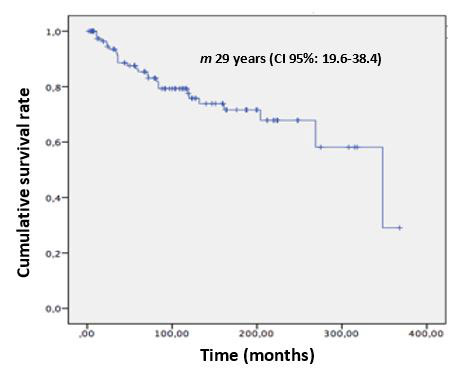Session Information
Session Type: Poster Session (Sunday)
Session Time: 9:00AM-11:00AM
Background/Purpose: Methotrexate (MTX) is the most frequently used medication in patients with Rheumatoid Arthritis (RA). However, several authors have questioned its success due to the presence of adverse events and the lack of adherence.
Objectives: To determine cumulative survival of MTX, frequency and type of adverse events and causes of discontinuation in patients with RA
Methods: Consecutive patients 18 years and older with a diagnosis of RA (ACR / EULAR 2010 criteria), who had begun treatment with MTX during their disease were included. Sociodemographic, clinical and therapeutic data were collected. Date of initiation and suspension of MTX, route of administration, concomitant treatments, consumption of coffee and tobacco, presence of adverse events (AE) were all consigned. Adherence was evaluated using the Compliance Questionnaire Rheumatology questionnaire 5-item summary version (CQR5). Statistical Analysis: Descriptive statistics. Chi² test or Fisher’s exact test; Survival of treatment by Kaplan-Meier and log Rank. Multiple logistic regression. A p value < 0.05 was considered significant.
Results: We included 118 patients, 101 were women (85.6%), with a median age (m) of 56 years (IQR 49-64) and disease duration m 10 years (IQR 6-18). Thirty-five patients (29.7%) were smokers and 56 patients (47.5%) consumed coffee. Eighty-five patients (72%) received MTX orally. 43.2% presented AE associated with MTX, but only 20 patients (16.9%) had to discontinue MTX. Gastrointestinal intolerance was the most frequent AE (27.1%), followed by laboratory test abnormalities (12.7%). 86.6% of the patients presented an adherence ≥80%. The median cumulative survival of MTX treatment was 348 months (95% CI: 235-460.9). In the univariate and multivariate analysis, there was no association of survival of MTX with sociodemographic variables, disease characteristics, concomitant treatment, route of administration, coffee consumption nor level of adherence.
Conclusion: In our cohort, adherence and survival of MTX treatment were good. The cumulative survival was almost 30 years. The presence of AE did not determine the suspension of treatment in most cases.
To cite this abstract in AMA style:
Sevillano J, Capelusnik D, Schneeberger E, Citera G. Tolerance, Survival, and Adherence to Methotrexate Treatment in Patients with Rheumatoid Arthritis [abstract]. Arthritis Rheumatol. 2019; 71 (suppl 10). https://acrabstracts.org/abstract/tolerance-survival-and-adherence-to-methotrexate-treatment-in-patients-with-rheumatoid-arthritis/. Accessed .« Back to 2019 ACR/ARP Annual Meeting
ACR Meeting Abstracts - https://acrabstracts.org/abstract/tolerance-survival-and-adherence-to-methotrexate-treatment-in-patients-with-rheumatoid-arthritis/

